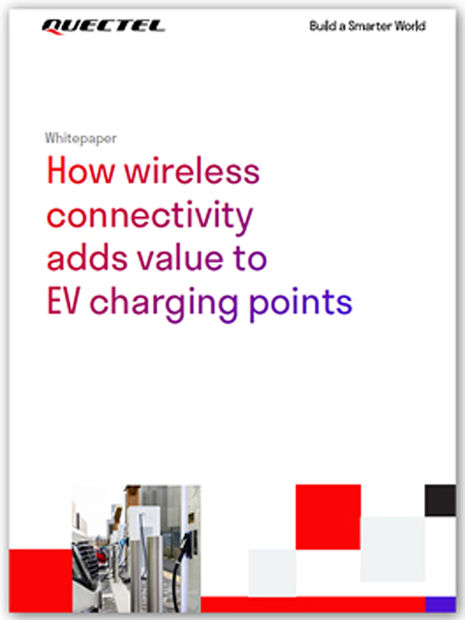Quectel whitepaper details wireless connectivity for EV charging
- April 4, 2022
- Steve Rogerson

Quectel Wireless has published a whitepaper explaining the applications for wireless connectivity in the electric-vehicle charging market.
As markets across the globe turn away from fossil-fuelled cars, demand for electric vehicle (EV) charging is increasing. At the same time, the number of charging points needs to grow and the application of wireless technologies to these is enabling better management, improved customer experience and increased charging point use.
The paper, titled “How wireless connectivity adds value to EV charging points”, explains the dynamics that are driving the EV charging market and details how wireless connectivity adds value to the charging point sector.
With analyst firm Berg Insight estimating that more than five million EVs were sold globally in 2021 and sales predicted to increase, it is clear that the 22.8 million charging points predicted to exist by 2025 will often become congested and drivers will need to use mobile connectivity to find available points, manage their charging remotely and pay for electricity they consume.
Global deployments of EV charging stations are set to increase at a 31% CAGR to more than 66 million units by 2030 but this is not a unified global market. The paper details how charging habits are fragmented with the European market focused on home-based charging while the USA and China see greater usage of public charging stations, perhaps because their larger geographies involve longer journeys and greater need to charge EVs away from home.
Wireless provides a means to connect dense charging sites rapidly and simply and can provide a backup to help ensure charging points remain operational. Uptime is essential to the business cases of charging operators who are motivated to increase returns on their infrastructure investments. Systems that cannot connect, cannot broadcast their availability or enable users to be billed, and wireless is therefore well matched. The paper reveals the applications enabled by wirelessly connecting EV chargers and assesses future developments in the sector.
The paper also details how Chinese firm Quectel’s portfolio of modules and antennas can help EV charging point operators. The company’s BG950 and BG951 LTE Cat-M1 modules are profiled alongside the EG91 LTE Cat1 module series and the company’s range of antennas.
To learn more about the road ahead for EV charging and how wireless connectivity is driving charge point availability, read the whitepaper here.





